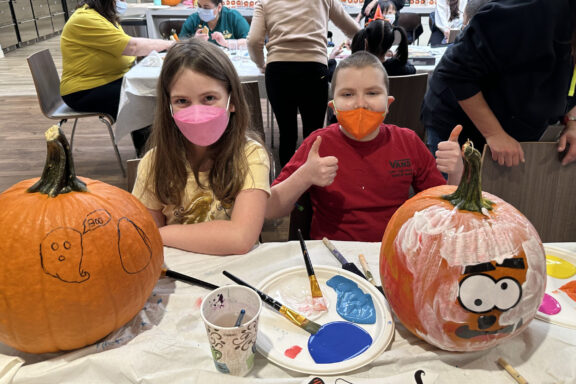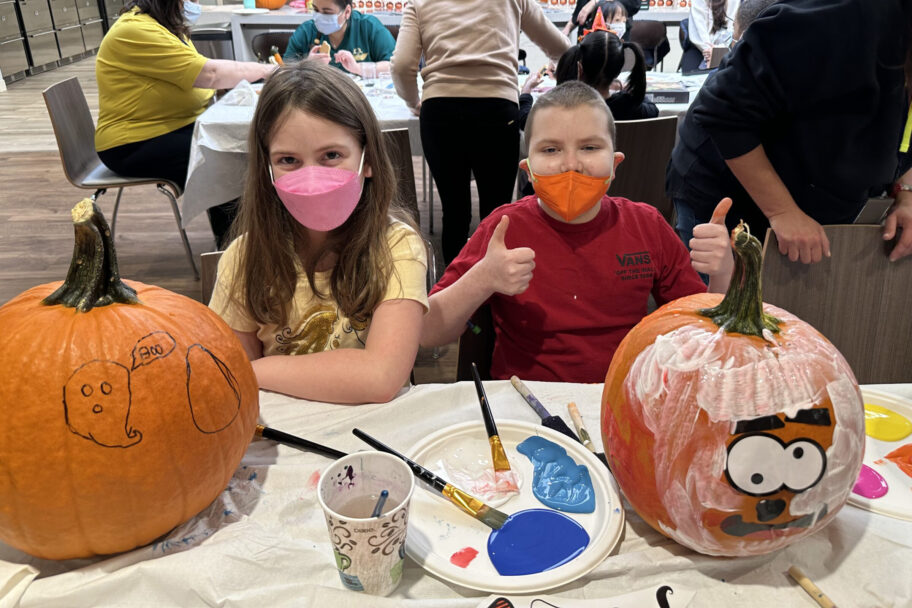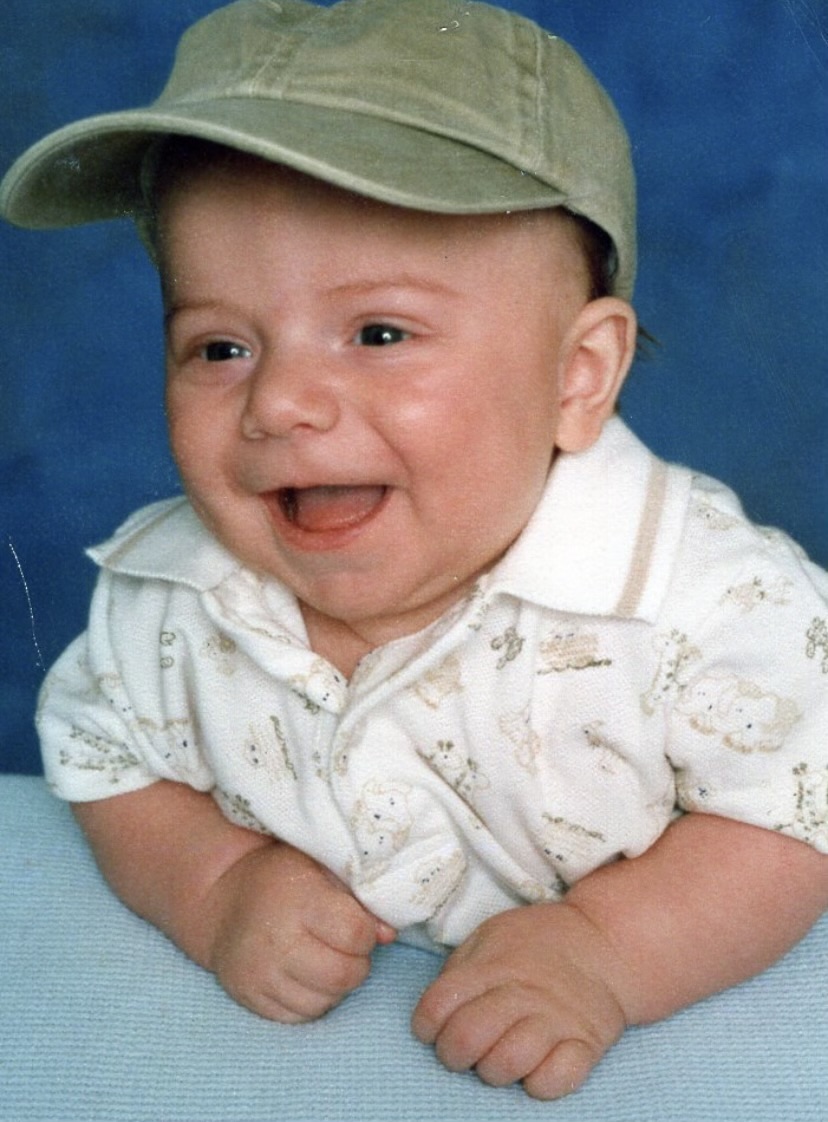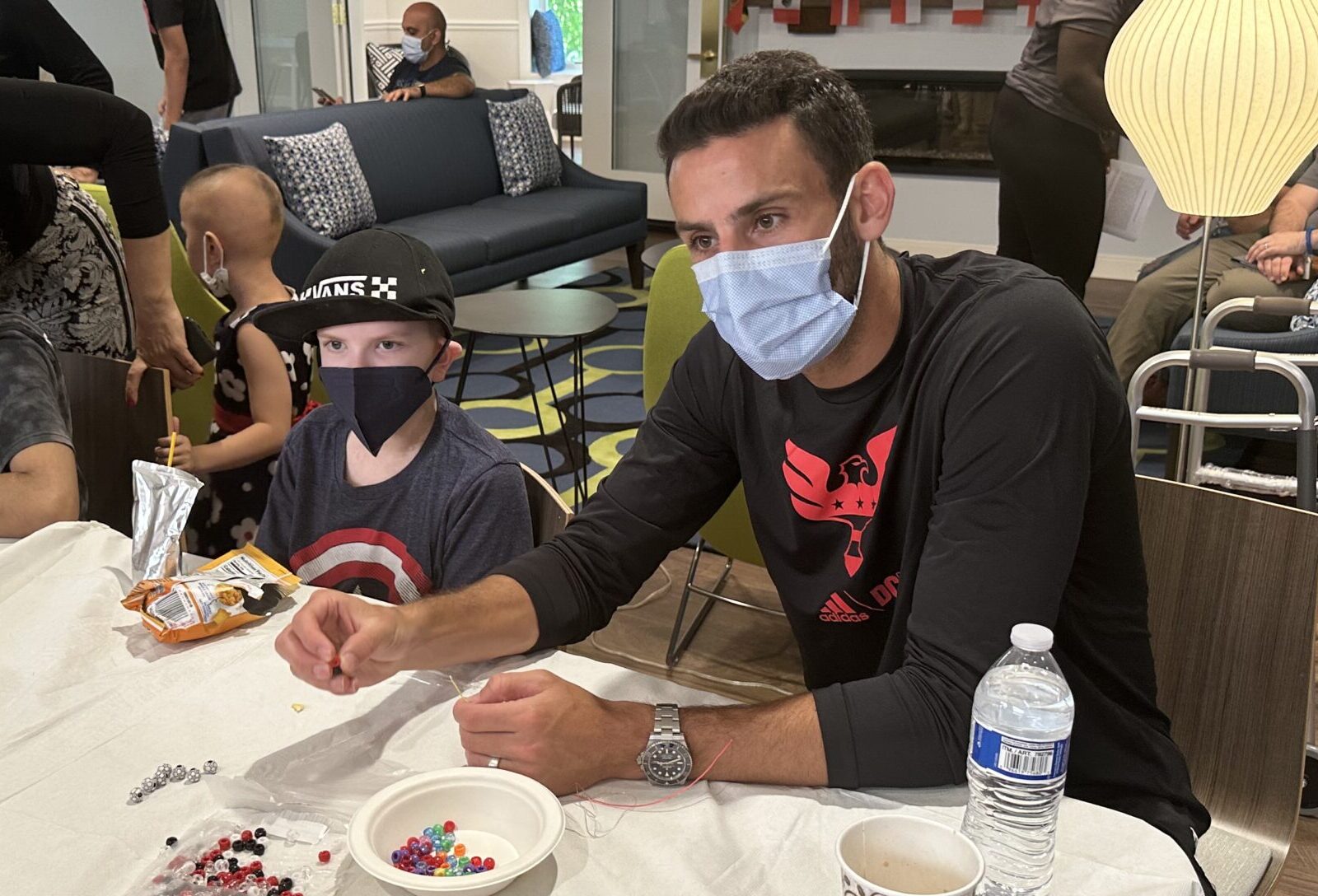

A family’s new lease on life after a 20-year journey
Zachary’s life was in jeopardy. An 11-year-old from Pahrump, Nevada, he suffered from Fas-associated protein with death domain (FADD) deficiency, an ultra-rare and severe gene mutation characterized by recurrent infections, encephalopathy, cardiac abnormalities, and short life expectancy.
The diagnosis was the beginning of a long and, at times, confusing medical journey for Zachary and his family, with doctors facing challenges they had never encountered before. By the fall of 2022, he and his family were on their way to The Children’s Inn at NIH so that Zachary’s eight-year-old sister, Avery, could serve as his bone marrow donor as part of a potentially life-saving treatment at the NIH.
As rare and serious as his diagnosis was, it seemed straightforward enough to those who met him in those early days at The Inn. His sister would save his life, and the family would begin to move past this devastating time. But for Zachary, Avery, and their family, it was never quite that simple. And the story stretched back further than either of them had been alive.
Zachary is the fifth-born child of Shawn and Erin Holmes. Three of his older siblings, Paul, Sarah, and Alyssa, were grown and living on their own by the time their kid brother arrived in Bethesda, MD at the NIH Clinical Center. But for Shawn and Erin, this was unfortunately not their first experience confronting the painful reality of caring for a sick child. In 2001, more than a decade before Zachary was born, the couple’s second son, Jacob, developed seizures and passed away when he was just 18 months old.

At the time, Shawn, Erin, and their doctors believed that Jacob’s tragic passing was the result of a bad reaction to the MMR vaccine given at his one-year checkup. There was nothing wrong with their eldest child, Paul, and before long, two more healthy children, daughters Sarah and Alyssa, were born.
“There was what I call the dark period right after Jacob’s passing,” Shawn remembered. “What got us through is that when we buried Jacob, Erin was eight-and-a-half months pregnant with Sarah, and we still had Paul at home. Ultimately, I could have buried my head and probably ruined the lives of our son and daughter-to-be. Or I could, as I called it, ‘fake it ’til I make it.’ Put on the fake smile and try not to live in the darkness. All that would do is make for a worse life. What got me through was those kids who needed us.”
As the family continued forward with their grief, they welcomed another child in 2012, Zachary. At first, he seemed to be healthy and thriving. But when Zachary was 14 months old, he came down with the flu and ended up in the hospital, where he experienced a grand mal seizure.
By the time Zachary was two years old, his life was already full of chilling déjà vu moments for his parents. Fortunately, doctors at the UCLA Medical Center discovered a gene mutation that explained Zachary’s seizures and offered some retrospective answers about what had happened to Jacob.
Zachary seemed to recover after the first grand mal seizure but it was only two years before he suffered a second seizure, then two more years before the third. His doctors referred him to immunologists who recommended that his parents do everything they could to keep him healthy, thinking that the genetic mutation was weakening his immune system. But over time, it became apparent that there was more going on medically than just seizures.
“There weren’t any people living with this disease,” Erin explained. “The doctors didn’t know what to do. His immune system was attacking his brain.” As they explained, no matter how many prestigious doctors examined Zachary, they would inevitably come away with some new reason to tell his parents, “I’ve never seen that before.”
“Welcome to our Zach,” Shawn laughed. “If we didn’t surprise you, we didn’t do our job.”
Doctors figured out over the years that the viruses Zachary would acquire were not necessarily what was hurting him. “He would get sick and easily beat whatever it was, but the FADD [affected] the messaging system for the immune system,” Shawn said. “So, it would not stop producing white blood cells after he got better, and they would start eating other parts of his body—organs and the brain specifically. We were fighting the wrong fight for the first eight years.”
In 2020, Zachary was at a low point. More than 30 percent of his brain was inflamed. Then, the COVID-19 virus hit. Ironically, it was the blessing in disguise that the family needed.
When his doctors enacted strict quarantining protocols, they referred Zachary to colleagues at Children’s Hospital Los Angeles. Right away, his parents described, the doctors began to recognize what was happening. At first, the message to Shawn and Erin was not encouraging.
“They told us to prepare for the worst,” Shawn said. “To provide palliative care. He was not strong enough for a bone marrow transplant.”
Already grieving the loss of a child, Shawn and Erin refused to accept that as the best course for their son. “I think that’s why we made it this far,” Erin smiled. “We couldn’t let that happen again.”

With his parents pressing for alternate options, Zachary’s doctors took a chance on a multiple sclerosis drug which, they hoped, would block his immune system from reaching his brain. Miraculously, it worked. But it was not a long-term solution. Though the drug prevented the immune system from attacking the brain, it also prevented the immune system from healing any external disease which might attack it. “As our doctors called it, it’s a bit of Russian Roulette,” Shawn said. “There might be 1,000 chambers in the gun, but eventually, it will get you if you don’t do something. The bone marrow transplant is the something.”
Enter Avery. Born three years after Zachary, Avery is a bright, caring girl who grew up loving gymnastics. By 2022, Zachary’s brain inflammation had been significantly improved thanks to the experimental treatment, reducing 90 percent in size. But he still needed a transplant, and Avery proved to be a perfect match as a donor. So a year ago, in November 2022, the parents and two younger children came east to the NIH Clinical Center, where they would stay at The Children’s Inn as they prepared for, underwent, and recovered from the procedure.
When a patient receives a bone marrow transplant, their doctors put them through a series of tests designed to ensure their safety and preparedness for the grueling procedure and recovery. What may not be as well known is that the bone marrow donor also goes through tests for the same reason. As part of the preparation for the procedure, Avery underwent an EKG test, and doctors discovered something that immediately and dramatically threw a wrench in everyone’s plans.
“They found a hole in the atrial vein leaking into the right chamber,” Avery explained about the congenital heart defect discovered by doctors at the NIH.
Instead of saving her brother’s life, Avery found herself back in the car, driving across the country to Los Angeles, where the seven-year-old underwent open heart surgery on December 30 that may have saved her own.
“Zachary’s doctors felt that it was urgent that they get her in quickly and get her recovered quickly because he needed this transplant as quickly as possible,” Erin said. “They pulled strings to get her in for her surgery, and two weeks after we found out about her heart, it was done.”
“They said this is something you can’t hear through a stethoscope,” Shawn said. “She probably would have had a heart attack in her teens or early 20s.”
Eleven weeks of recovery followed, but Avery remained determined to play a part in saving her brother. After all, he had essentially helped save her life too. And though she had been nervous about the procedure in November, after going through emergency open heart surgery, the prospect of bone marrow donation was more straightforward.
At long last, the family returned east to Bethesda, making their third cross-country drive in five months, and the transplant took place on May 9. It was a momentous occasion for the family and the entire American medical community, as it was the first transplant of his type involving FADD deficiency to be done in the United States.
Playdates had not been an option for Avery back home. Her brother’s illness precluded that, and she had been home-schooled for third grade during the 2022-23 school year in preparation for the transplant. So on their visits to The Children’s Inn, she relished the opportunity to be just one of the kids.

Zachary & Avery’s dad, ShawnThe Inn made an unthinkable thing possible. It provides this great community, which makes you more comfortable as kids and parents.”
“I mostly just like the kids here,” Avery said. “You can just play with other kids. Back home, I couldn’t do that at all.” She has taken full advantage of The Inn’s programming opportunities, participating in special events and field trips she never dreamed of a year ago. She also has loved the newly refurbished playground and the indoor play spaces that make The Inn such a “Place Like Home” for children like her.
“I got the better end of the stick,” Shawn laughed as he described splitting parenting duties with Erin. After Avery’s single night in the Clinical Center recovering from the transplant, Shawn has been with her at The Inn most of the time while Erin stayed with Zachary, whose in-patient tenure at the Clinical Center lasted several weeks. “Avery was very lucky [for those] six weeks. There was a group of girls around the same age, and they would play from 8:00 in the morning to when I dragged her back in the room at midnight, telling her that we had to cut it off eventually! It was the families that made it work. The kids used every activity and every space to draw themselves together. The kids made the activities fun, and the activities made for a place where the kids could have that fun. It was a great balance.”
Zachary, meanwhile, has taken pleasure in the little things after he returned to The Inn to continue his recovery. The fridge in the Bistro, for example, has captivated him, with its constantly refilling supply of chocolate milk, string cheese, and juice. He also has made appearances at Bingo and painting nights. He was not feeling up to a field trip when The Inn hosted its annual Christmas in July event, but Avery made sure to factor him into her plans, buying presents for Zachary in addition to herself.
Zachary’s recovery has had its ups and downs over the ensuing months. He initially returned to The Inn from the Clinical Center only to have a seizure send him right back across the street for an additional week. “They said that’s typical of the timing,” Erin explained. “We don’t anticipate anything else.”

On the Saturday before Thanksgiving, a year after their first visit to The Inn, Zachary, Avery, Shawn, and Erin went home at long last. They will return at least once a year for the next five years for follow-ups to Zachary’s groundbreaking procedure, but doctors and everyone around him are optimistic about his long-term outlook.
Over the last six months, as Zachary recovered from his transplant and Avery displayed just what a strong heart she has, their parents were grateful that they have had the whole family together, even after months away from home. “It’s easier that we are all together,” Erin said. “We have been anticipating this for a long time, so it was worth being here. It’s convenient and super easy [at The Inn]. It is an amazing place.”
“The Inn made the whole experience tolerable,” Shawn smiled. “It made an unthinkable thing possible. It provides this great community, which makes you more comfortable as kids and parents. You pick where you want to do a transplant like this based on the doctors, of course, but a big part of doing this here rather than back in Los Angeles was The Children’s Inn. The ability for the kids to be around other kids creates a family. It’s a lot easier to be one-of-a-kind in a group of hundreds of one-of-a-kinds.”
Zachary & Avery’s dad, ShawnOur attitude has always been that this is the hurdle in front of us, so we jump it and see what’s next. We’ve had a lot of luck and a lot of angels praying for us.
With a hopeful eye toward the future, Zachary, Avery, and their parents are excited about the opportunity to put the medical saga in the rearview mirror, but doing the same with The Children’s Inn will be bittersweet. They are not sure exactly what will come next. But they know they’ll be ready for it.
“There’s no simple answer for what we hope is the end of a 20-year journey,” Shawn said. “Is someone writing our script? If you wrote a movie, it would be too unbelievable. But our attitude has always been that this is the hurdle in front of us, so we jump it and see what’s next. We’ve had a lot of luck and a lot of angels praying for us.”

